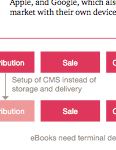Study Published: the system architecture of the digital public library
26 march 2014
The reports of the study on the current and future system architecture of the digital library have been recently published.
The term “digital library” is here used as a collective name for all of a library’s products, processes and services that are digital and/or automated.
The study summary lists the future work zones for the Flemish Public libraries:
- Business intelligence (BI)
- IT maturity
- Web presentation
- Identity and Access Management (IAM)
- Digital Collections
- Collection Management and cataloguing
- Architecture consolidation (SOA)
The summary is available in French, Dutch and English:
- Summary: DIGB-SA_ManagementSummary-EN
- Résumé de l’étude: DIGB-SA_ManagementSummary-FR-Final
- Samenvatting : DIGB-SA_ManagementSummary-NL
The complete study has three main chapters :
- Current system architecture of Flemish public libraries (AS-IS)
- Evolution of the Flemish public libraries’ System architecture (change requirements)
- The Future system architecture of Flemish public libraries (TO-BE)
The future system architecture is in fact a generic future-proof ICT blueprint for a public library. The blueprint is a set of business services, business processes, Applications, SOA Services and technological elements documented in the Archimate notation.
The complete study is available
- in English : 2013-11-27-DigitalLibrarySystemArchitecture
- in het Nederlands: 2014-02-04-DigitaleBibliotheekSysteemArchitectuurStudie
I would like to thank the colleagues who worked with me on this study:
- François Vermaut (IT Strategy, BPM, SOA, ITIL…)
- Rosemie Callewaert (Public Library field expertise, User Experience, BIBFRAME, FRBR…)
- Simon Kroeger (Proof reading english text)
- Veerle Vanlooy (Vertalingen Vanlooy)
I also would like to thank the steering commitee (Bart Beuten, Jan Braekman, Patrick Vanhoucke ,Stefaan Froyman), all the workshop and participants. Their input has been key. I would like also to thank Alexandre Lemaire who helped me to compare the Flemish situation with the situation of the Fédération Wallonie-Bruxelles.…

